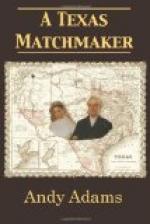rode the range, until he could have told at a distance
one half his holdings of cattle by flesh marks alone.
A few days before the date set for the trial, Enrique
brought in word one evening that an outfit of strange
men were encamped north of the river on the Ganso
Tract. The vaquero was unable to make out their
business, but was satisfied they were not there for
pleasure, so my employer and I made an early start
the next morning to see who the campers were.
On the extreme northwestern corner of our range, fully
twenty-five miles from headquarters, we met them and
found they were a corps of engineers, running a preliminary
survey for a railroad. They were in the employ
of the International and Great Northern Company, which
was then contemplating extending their line to some
point on the Rio Grande. While there was nothing
definite in this prior survey, it sounded a note of
warning; for the course they were running would carry
the line up the Ganso on the south side of the river,
passing between the new tanks, and leaving our range
through a sag in the hills on the south end of the
grant. The engineer in charge very courteously
informed my employer that he was under instructions
to run, from San Antonio to different points on the
river, three separate lines during the present summer.
He also informed us that the other two preliminary
surveys would be run farther west, and there was a
possibility that the Las Palomas lands would be missed
entirely, a prospect that was very gratifying to Uncle
Lance.
“Tom,” said he, as we rode away, “I’ve
been dreading this very thing for years. It was
my wish that I would never live to see the necessity
of fencing our lands, and to-day a railroad survey
is being run across Las Palomas. I had hoped
that when I died, this valley would be an open range
and as primitive as the day of my coming to it.
Here a railroad threatens our peace, and the signs
are on every hand that we’ll have to fence to
protect ourselves. But let it come, for we can’t
stop it. If I’m spared, within the next
year, I’ll secure every tract of land for sale
adjoining the ranch if it costs me a dollar an acre.
Then if it comes to the pinch, Las Palomas will have,
for all time, land and to spare. You haven’t
noticed the changes in the country, but nearly all
this chaparral has grown up, and the timber is twice
as heavy along the river as when I first settled here.
I hate the sight even of a necessity like a windmill,
and God knows we have no need of a railroad. To
a ranch that doesn’t sell fat beeves over once
in ten years, transportation is the least of its troubles.”




